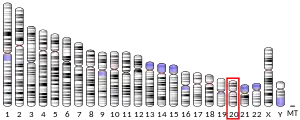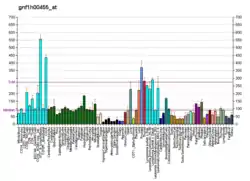| MRPS26 | |||||||||||||||||||||||||||||||||||||||||||||||||||
|---|---|---|---|---|---|---|---|---|---|---|---|---|---|---|---|---|---|---|---|---|---|---|---|---|---|---|---|---|---|---|---|---|---|---|---|---|---|---|---|---|---|---|---|---|---|---|---|---|---|---|---|
| |||||||||||||||||||||||||||||||||||||||||||||||||||
| Identifiers | |||||||||||||||||||||||||||||||||||||||||||||||||||
| Aliases | MRPS26, C20orf193, GI008, MRP-S13, MRP-S26, MRPS13, NY-BR-87, RPMS13, dJ534B8.3, mitochondrial ribosomal protein S26 | ||||||||||||||||||||||||||||||||||||||||||||||||||
| External IDs | OMIM: 611988 MGI: 1333830 HomoloGene: 12778 GeneCards: MRPS26 | ||||||||||||||||||||||||||||||||||||||||||||||||||
| |||||||||||||||||||||||||||||||||||||||||||||||||||
| |||||||||||||||||||||||||||||||||||||||||||||||||||
| |||||||||||||||||||||||||||||||||||||||||||||||||||
| |||||||||||||||||||||||||||||||||||||||||||||||||||
| |||||||||||||||||||||||||||||||||||||||||||||||||||
| Wikidata | |||||||||||||||||||||||||||||||||||||||||||||||||||
| |||||||||||||||||||||||||||||||||||||||||||||||||||
28S ribosomal protein S26, mitochondrial is a protein that in humans is encoded by the MRPS26 gene.[5][6]
Mammalian mitochondrial ribosomal proteins are encoded by nuclear genes and help in protein synthesis within the mitochondrion. Mitochondrial ribosomes (mitoribosomes) consist of a small 28S subunit and a large 39S subunit. They have an estimated 75% protein to rRNA composition compared to prokaryotic ribosomes, where this ratio is reversed. Another difference between mammalian mitoribosomes and prokaryotic ribosomes is that the latter contain a 5S rRNA. Among different species, the proteins comprising the mitoribosome differ greatly in sequence, and sometimes in biochemical properties, which prevents easy recognition by sequence homology. This gene encodes a 28S subunit protein. This gene lies adjacent to and downstream of the gonadotropin-releasing hormone precursor gene.[6]
References
- 1 2 3 GRCh38: Ensembl release 89: ENSG00000125901 - Ensembl, May 2017
- 1 2 3 GRCm38: Ensembl release 89: ENSMUSG00000037740 - Ensembl, May 2017
- ↑ "Human PubMed Reference:". National Center for Biotechnology Information, U.S. National Library of Medicine.
- ↑ "Mouse PubMed Reference:". National Center for Biotechnology Information, U.S. National Library of Medicine.
- ↑ Kenmochi N, Suzuki T, Uechi T, Magoori M, Kuniba M, Higa S, Watanabe K, Tanaka T (Sep 2001). "The human mitochondrial ribosomal protein genes: mapping of 54 genes to the chromosomes and implications for human disorders". Genomics. 77 (1–2): 65–70. doi:10.1006/geno.2001.6622. PMID 11543634.
- 1 2 "Entrez Gene: MRPS26 mitochondrial ribosomal protein S26".
Further reading
- Goldschmidt-Reisin S, Kitakawa M, Herfurth E, et al. (1999). "Mammalian mitochondrial ribosomal proteins. N-terminal amino acid sequencing, characterization, and identification of corresponding gene sequences". J. Biol. Chem. 273 (52): 34828–36. doi:10.1074/jbc.273.52.34828. PMID 9857009.
- Cavdar Koc E, Burkhart W, Blackburn K, et al. (2001). "The small subunit of the mammalian mitochondrial ribosome. Identification of the full complement of ribosomal proteins present". J. Biol. Chem. 276 (22): 19363–74. CiteSeerX 10.1.1.501.8919. doi:10.1074/jbc.M100727200. PMID 11279123.
- Deloukas P, Matthews LH, Ashurst J, et al. (2002). "The DNA sequence and comparative analysis of human chromosome 20". Nature. 414 (6866): 865–71. Bibcode:2001Natur.414..865D. doi:10.1038/414865a. PMID 11780052.
- Strausberg RL, Feingold EA, Grouse LH, et al. (2003). "Generation and initial analysis of more than 15,000 full-length human and mouse cDNA sequences". Proc. Natl. Acad. Sci. U.S.A. 99 (26): 16899–903. Bibcode:2002PNAS...9916899M. doi:10.1073/pnas.242603899. PMC 139241. PMID 12477932.
- Zhang Z, Gerstein M (2003). "Identification and characterization of over 100 mitochondrial ribosomal protein pseudogenes in the human genome". Genomics. 81 (5): 468–80. doi:10.1016/S0888-7543(03)00004-1. PMID 12706105.
- Scanlan MJ, Gout I, Gordon CM, et al. (2003). "Humoral immunity to human breast cancer: antigen definition and quantitative analysis of mRNA expression". Cancer Immun. 1: 4. PMID 12747765.
- Ishiguchi H, Izumi H, Torigoe T, et al. (2004). "ZNF143 activates gene expression in response to DNA damage and binds to cisplatin-modified DNA". Int. J. Cancer. 111 (6): 900–9. doi:10.1002/ijc.20358. PMID 15300802. S2CID 37308382.
- Gerhard DS, Wagner L, Feingold EA, et al. (2004). "The status, quality, and expansion of the NIH full-length cDNA project: the Mammalian Gene Collection (MGC)". Genome Res. 14 (10B): 2121–7. doi:10.1101/gr.2596504. PMC 528928. PMID 15489334.




